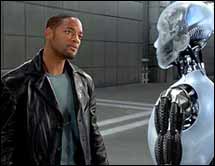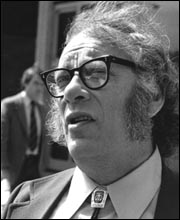 Before, much before we had satellites and digital images of Mars, the writers saw it coming.
Before, much before we had satellites and digital images of Mars, the writers saw it coming.
In the 1800s, Jules Verne wrote about rocket ships in From the Earth to the Moon. Everyone around smiled, thinking of it as a comic novel.
In 1920, an aeronautics space scientist in Russia called Konstantin Tsiolkovsky wrote Beyond the Planet Earth, a novel about space colonies and artificial satellites. He faded into obscurity soon after.
Alfred Bester, in The Demolished Man (1953), brought in stories about humanoids and androids.
And somewhere around 1950, Isaac Asimov came up with a series of short stories titled I, Robot.
![]()
More on rediff.com!
![]()
![]()
![]()
![]()
KHGN: Part-time fun![]()
Meet the man Farah Khan will wed![]()
Exclusive! Ash on KHGN![]()
![]()
![]()
Not, half a century later, here's an appealing thought -- Verne, Tsiolkovsky, Bester and Asimov, sharing a bottle of wine, laughing out loud at the rest of us.
Coming this week to a theatre near you is another in a long line of films drawing inspiration from Asimov.
A visit to the I, Robot web site boasts images of a buff Will Smith in shades, staring ominously, the backdrop taken over by armies of unsmiling, taciturn robots. 'We trust them with our homes,' reads the film's trailer. 'We trust them with our children. We trust them with our lives... But can they be trusted?'
Technical wizardry aside, this is a film about questions to which no easy answers are forthcoming. Asimov wrote around 400 books, including novels and short stories based on the future of mankind. The stories can be categorised into Robot novels (about the development of the 'positronic' robot), Elijah Baley novels (the first wave of Galactic colonisation), Galactic novels (history of the First Galactic Empire) and the Foundation series (beginnings of a greater Empire built on the ruins of an older one). These works have, in our lifetime, been read thoroughly, and misread thoroughly. They have yielded life-changing ideas and, in some cases, even lead to mass-murder.
In fact, some theorists believe Shoko Asahara, leader of the Japanese cult Aum Shinrikyo -- responsible for killing 12 people on the Tokyo subway -- looked at Asimov's 'Foundation' series as a blueprint for the cult's long-term plans. There has even been speculation that Asimov's shadow looms over the events of September 11. It is a theory that gained credence from the publication of 'Foundation' in Arabic, in 1951. Apparently, when translated to Arabic, the title reads Al Qaeda.
What the murderers conveniently overlooked was Asimov's opposition to violence.
Leaving aside murder, however, it is science fiction and his fascination with robotics that has made Asimov legendary.
 Robots (the term is Czech in origin) are defined as programmable, self-controlled devices consisting of electronic, electrical, or mechanical units. The problem arises when you begin to consider a machine so human-like that, at some point, it becomes alive. The possibilities are immense.
Robots (the term is Czech in origin) are defined as programmable, self-controlled devices consisting of electronic, electrical, or mechanical units. The problem arises when you begin to consider a machine so human-like that, at some point, it becomes alive. The possibilities are immense.
It may have been some of these possibilities that compelled Asimov (right) to come up with his 'Three laws of robotics, in Runaround (1942): 'A robot may not injure a human, or, through inaction, allow a human being to come to harm; A robot must obey the orders it is given by human beings except where such orders would conflict with the First Law; A robot must protect its own existence as long as such protection does not conflict with the First or Second Law.'
Now, this is where Hollywood steps in. Asimov's I, Robot is an argument against the superstitious fear of machines. In the book, the efficiency of machines eliminates famine and unemployment. It is the robots that work selflessly for a better world; the humans remain simply suspicious, bumbling beings.
The film, set in 2035, tracks one of these 'suspicious' humans -- Chicago Police Detective John Spooner (Will Smith) -- as he investigates the murder of Dr Alfred Lanning, a case in which a robot has been implicated. The Three Laws of Robotics have been broken. It stands to reason, then, that only chaos must follow. Not if Will Smith can help it, of course.
Asimov argued that machines were better than humans, not just at mechanical details but also at making moral decisions. His book's protagonist calls robots a 'better breed' because superior logic leads to superior ethics. Hollywood, on the other hand, knew that it could ruin a potential blockbuster by adopting this line of thought. Accordingly, I, Robot the film argues that, when it comes to morality, emotion is a better tool than reason. The robots are looked down upon as 'slaves to logic,' and the villain defends treachery with 'My logic is undeniable.'
Where there are breakthroughs in science and technology, questions are inevitable. When the time comes for answers, however, chances are we'll find them in an obscure piece of fiction that arrived half a century before our reality.
For the moment, you might want to catch the film. And give Asimov his due.
Photograph of Isaac Asimov: Getty Images
Also Read: Will Smith stands out in I, Robot





